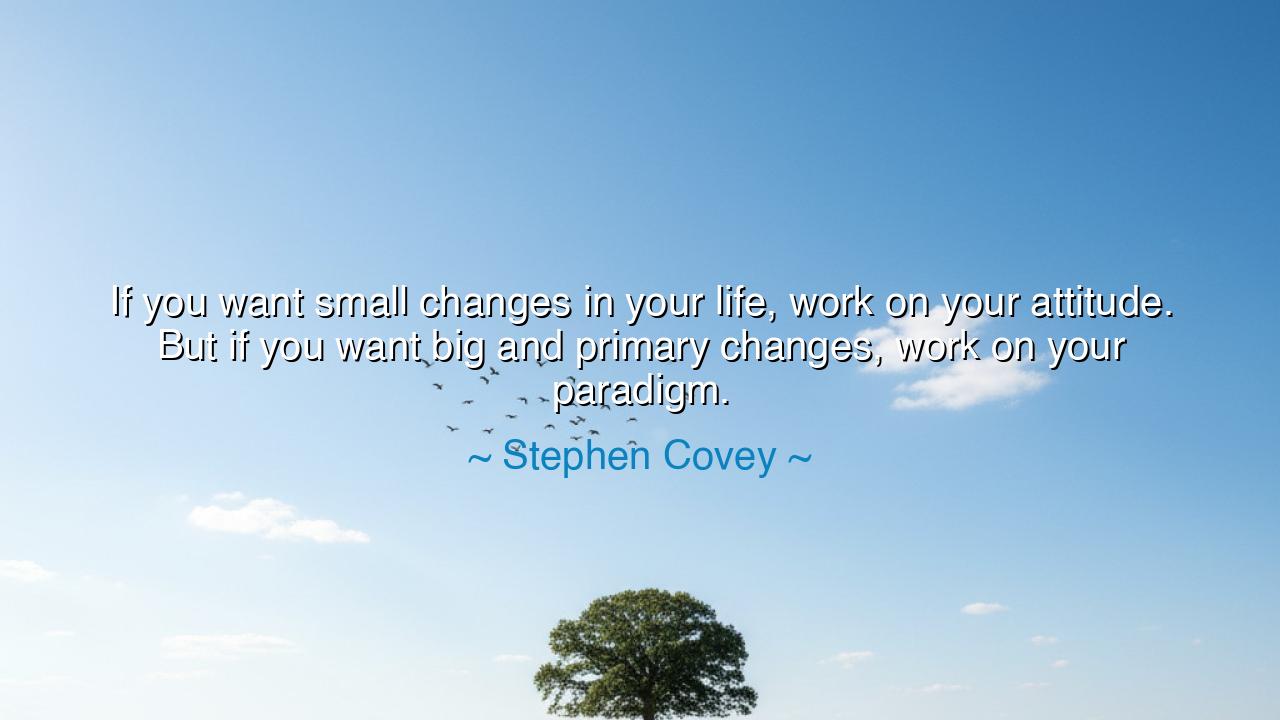
If you want small changes in your life, work on your attitude.
If you want small changes in your life, work on your attitude. But if you want big and primary changes, work on your paradigm.






Host: The room felt peaceful, the evening air settling around them as the day transitioned into night. Jack sat at the table, his cup of tea resting in front of him, his fingers lightly tapping the edge. Jeeny stood near the window, her arms loosely crossed, gazing out at the street as she reflected on the words of Stephen Covey.
Jeeny: “I’ve been thinking about Stephen Covey’s words: ‘If you want small changes in your life, work on your attitude. But if you want big and primary changes, work on your paradigm.’ It’s such an interesting way to look at change, isn’t it? The idea that small shifts come from adjusting our attitudes, but true transformation requires something deeper—changing the way we see and approach the world.”
Jack: “Yes, exactly. Covey is saying that a lot of the small changes we make in our lives come from shifting our mindset—how we think about things, how we approach situations. But when it comes to big, fundamental change, we need to change our paradigm, the core framework through which we see the world. A paradigm is like the lens we view everything through, and if we don’t change that, the small changes we make won’t have the lasting impact we’re hoping for.”
Jeeny: “Exactly. Attitude is important, no doubt, because it shapes our day-to-day reactions and responses. But paradigm is the deeper structure. It’s about the way we understand ourselves and the world. If we want to experience real, long-lasting change, we have to work on shifting that deeper, more foundational layer. It’s like a tree—you can prune the branches all day, but unless you change the root, the tree won’t grow differently.”
Host: The stillness in the room deepened, the weight of their conversation settling in. Jack’s fingers stopped moving over the cup, and Jeeny’s gaze softened, reflecting on how often people seek quick fixes without considering the fundamental shifts needed to create lasting transformation.
Jack: “It makes me think about how easy it is to focus on the surface level of change. We might try to improve our habits or attitudes, and those things can certainly make a difference. But if we’re still operating from the same core beliefs and perceptions, the changes won’t be sustainable. To create real transformation, we need to rewire how we think about things on a much deeper level.”
Jeeny: “Yes, and that’s why paradigms are so powerful. They shape everything we do—from how we interact with others to how we perceive challenges. When we work on shifting our paradigms, we start to see things differently. We open up new possibilities, new ways of thinking, and the changes that follow are transformative.”
Jack: “It’s also about recognizing that paradigms are deeply ingrained. They’re like the default settings of our minds. Changing them takes time and effort, but it’s the only way to create the kind of change that truly shifts the course of our lives. Small attitude changes are great for adjustments, but paradigm shifts are what create real, primary transformation.”
Jeeny: “Exactly. And I think this is where people often get stuck. They want big, life-changing results, but they focus on the wrong things. They try to change their attitude or behavior without addressing the underlying beliefs and assumptions that are guiding those actions. If we don’t address the core of how we see the world, those changes will always feel temporary.”
Host: The room felt even quieter now, the conversation settling into a quiet realization. The idea that attitude changes are good for making small adjustments, but true transformation comes from shifting our paradigms, had taken root. Jack leaned back in his chair, his fingers gently resting on the table, while Jeeny’s expression softened as she reflected on how deep-rooted paradigms shape our lives and our ability to change.
Jack: “So, in a way, Covey is encouraging us to go deeper. If we really want to change, we have to get to the root of how we see the world—our paradigms. It’s about understanding that true change isn’t just about attitude or habits; it’s about shifting our core perceptions of life.”
Jeeny: “Yes. It’s the paradigm that drives everything else. If we want to transform our lives, we have to start by asking ourselves, ‘What beliefs, assumptions, or perspectives do I have that are holding me back?’ Once we shift that, the smaller changes in attitude, behavior, and actions will naturally follow.”
Host: The evening had fully settled in now, the quiet understanding between them a reminder that real transformation comes from shifting not just how we act, but how we think. Stephen Covey had shown them both that while small changes are important, the real work lies in changing the deeper structures of our beliefs and perceptions—the paradigms that shape our reality. The world outside had darkened, but inside, there was light—a recognition that paradigm shifts are the key to creating lasting and meaningful change.






AAdministratorAdministrator
Welcome, honored guests. Please leave a comment, we will respond soon